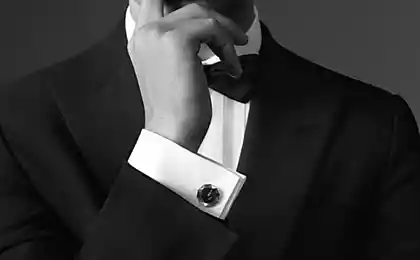428
As a manner of speech betrays uncertainty
Uncertainty sooner or later it becomes noticeable to others. It makes us feel so helpless that in the end we really reveal our weakness and be vulnerable. As a red sock, accidentally caught in the machine with crisp white linen, indecision leaves marks in our speech text, marring the image of the perfectly balanced person that we are trying to broadcast to others.

still from the film "King says!"
But if you know which linguistic markers should ensure you can recognize and eliminate uncertainty in speech.
First and foremost, beware of overcompensation. Nothing betrays an inferiority complex, as self-promotion. Researchers from Harvard and the University of Pennsylvania reported that people on the fringes of any group are more likely to use words that emphasize their belonging to this group. But the key figures are not seeking to demonstrate their involvement.
The scientists also investigated the sites of the international airports: small airports are much more likely to emphasize its international status than the airports of Heathrow level. Finally, the researchers conducted the experiment with students of two universities of the ivy League, asking them to describe their schools. Students less prestigious University of Pennsylvania often emphasized the exclusivity of their University than their peers from Harvard.
Despite the fact that insecure people insist on their involvement in the group, they still prefer to speak only for myself. We now know that low self esteem is expressed in pronouns. Until recently, many experts believed that frequent use of the word "I" is characterized by the overbearing and narcissistic people, hungry for attention. But as written by James Pennebaker, a psychologist from the University of Texas at Austin, the pronoun is often signals of humiliation and subservience. A more confident person often means your territory (and possibly decides what you should do and not worry about what to do to him). "Man with high status focuses on the world, and people of low status asked yourself," said Pennebaker.

The uncertainty is reflected not only in what you say, but how you do it. Colleagues told me that she lowered her voice to appear more authoritative in difficult moments, or used big words.
Sociologists even have a term for how people modify their speech to sound more solid: linguistic uncertainty. It occurs when a person feels that his language indicates his inferiority. He's trying — consciously or not — to "borrow prestige" by different social groups, choosing atypical manner of speaking. Linguist William Labov first investigated this phenomenon in the 1960s. He found that in new York, representatives of the upper class pronounce the sound "r", and citizens from the lower classes often omit it at the end of words or before vowels. The scientist asked the employees of a prestigious shopping centre Saks Fifth Avenue and discount store S. Klein to utter the phrase "forth floor". It turned out that the Saks employees more often try to imitate the "elite" pronunciation.
From linguistic uncertainty there is a more extreme form — over: when a real or imagined grammatical rule is used in the wrong context. In such cases, the attempt to speak "correctly" paradoxically leads to incorrect results.
Also, there are speech features that we mistake for signs of insecurity, although they are not. For example, the cracked voice, the manner of uttering the sentence with a question mark — more a Testament to the vitality and propensity for innovation, and the habit of frequently saying "uh" or "you know" — a sign of openness and honesty of the narrator. published
P. S. And remember, only by changing their consumption — together we change the world! ©
Source: theoryandpractice.ru/posts/9374-loser-mark

still from the film "King says!"
But if you know which linguistic markers should ensure you can recognize and eliminate uncertainty in speech.
First and foremost, beware of overcompensation. Nothing betrays an inferiority complex, as self-promotion. Researchers from Harvard and the University of Pennsylvania reported that people on the fringes of any group are more likely to use words that emphasize their belonging to this group. But the key figures are not seeking to demonstrate their involvement.
The scientists also investigated the sites of the international airports: small airports are much more likely to emphasize its international status than the airports of Heathrow level. Finally, the researchers conducted the experiment with students of two universities of the ivy League, asking them to describe their schools. Students less prestigious University of Pennsylvania often emphasized the exclusivity of their University than their peers from Harvard.
Despite the fact that insecure people insist on their involvement in the group, they still prefer to speak only for myself. We now know that low self esteem is expressed in pronouns. Until recently, many experts believed that frequent use of the word "I" is characterized by the overbearing and narcissistic people, hungry for attention. But as written by James Pennebaker, a psychologist from the University of Texas at Austin, the pronoun is often signals of humiliation and subservience. A more confident person often means your territory (and possibly decides what you should do and not worry about what to do to him). "Man with high status focuses on the world, and people of low status asked yourself," said Pennebaker.

The uncertainty is reflected not only in what you say, but how you do it. Colleagues told me that she lowered her voice to appear more authoritative in difficult moments, or used big words.
Sociologists even have a term for how people modify their speech to sound more solid: linguistic uncertainty. It occurs when a person feels that his language indicates his inferiority. He's trying — consciously or not — to "borrow prestige" by different social groups, choosing atypical manner of speaking. Linguist William Labov first investigated this phenomenon in the 1960s. He found that in new York, representatives of the upper class pronounce the sound "r", and citizens from the lower classes often omit it at the end of words or before vowels. The scientist asked the employees of a prestigious shopping centre Saks Fifth Avenue and discount store S. Klein to utter the phrase "forth floor". It turned out that the Saks employees more often try to imitate the "elite" pronunciation.
From linguistic uncertainty there is a more extreme form — over: when a real or imagined grammatical rule is used in the wrong context. In such cases, the attempt to speak "correctly" paradoxically leads to incorrect results.
Also, there are speech features that we mistake for signs of insecurity, although they are not. For example, the cracked voice, the manner of uttering the sentence with a question mark — more a Testament to the vitality and propensity for innovation, and the habit of frequently saying "uh" or "you know" — a sign of openness and honesty of the narrator. published
P. S. And remember, only by changing their consumption — together we change the world! ©
Source: theoryandpractice.ru/posts/9374-loser-mark























